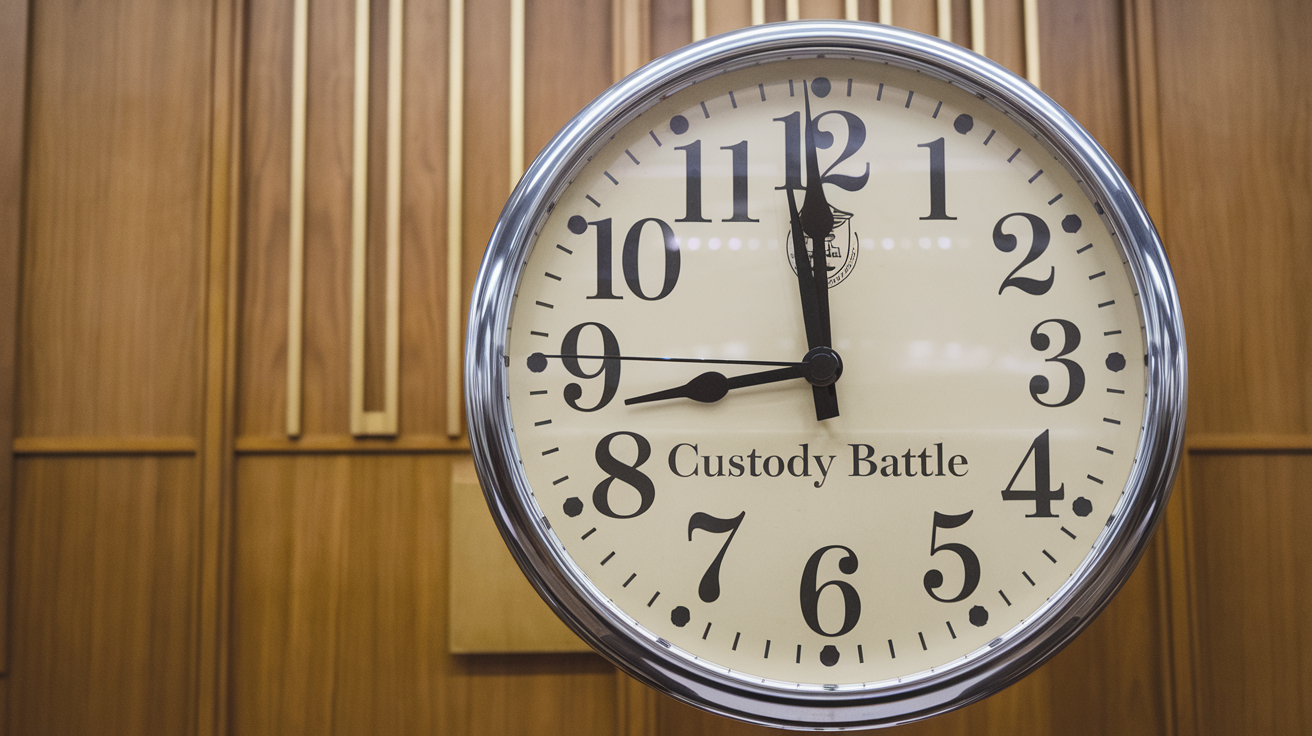Fighting for your child’s custody takes a toll on your heart and wallet. As a parent, waiting for the court’s decision can feel like the longest days of your life. Most parents ask: “When will this end?”
The timeline of a custody battle depends on several key elements. These include how well both parents work together, the court’s schedule, and local family laws.
Some cases wrap up in 3 months, while others may need a year or more to settle.
This guide walks you through what affects your case’s length. You’ll learn about each stage of the process and get tips to help things move along smoothly.
Understanding these timeframes helps you plan better for yourself and your child.
How Long Do Custody Battles Take

Most custody cases take between 6 to 12 months to reach a final decision. The length varies based on where you live and your specific situation.
A simple case where parents agree on most points might finish in just three months. Complex cases with heated disagreements could stretch beyond a year.
Several stages make up the total timeline.
- The first step, filing the custody petition, takes about 2-3 weeks to process.
- Next comes the temporary orders hearing, usually scheduled within 30 days. This hearing sets the rules both parents must follow until the final decision.
- The middle period involves gathering information, which typically spans 2-4 months. During this time, both sides share documents, meet with evaluators, and possibly attend mediation sessions. Each meeting and evaluation adds time to the process.
- The final stage includes the court dates and getting the judge’s decision. Court scheduling often causes the biggest delays.
Many family courts handle hundreds of cases, so you might wait 1-2 months between hearings.
Your lawyer can give you a better estimate based on your local court’s current workload.
Key Factors Affecting the Length of a Custody Battle

The length of a custody battle can vary significantly based on several key factors. Understanding these influences can help set realistic expectations and better handle the process.
- Simple vs. Complex Cases: Your case takes less time when both parents want similar arrangements. A case becomes longer when parents disagree about major decisions like school choice, medical care, or living arrangements. Extra court time helps sort out these important matters carefully.
- Parent Cooperation: Working together speeds up the process significantly. When parents talk openly and focus on their child’s needs, cases often finish within 3-4 months. Fighting over every detail leads to more court dates, longer waits, and added stress for everyone involved.
- Court Calendar Issues: Family courts handle many cases daily. Your local court’s schedule plays a big role in timing. Some areas might schedule hearings within weeks, while busy districts could make you wait months. Weather problems, staff shortages, or other cases running long can cause extra delays.
- Legal Help Choices: Having a lawyer often makes things move faster. Lawyers know the system and required paperwork, helping avoid common delays. Self-represented parents might need extra time to learn procedures and file documents correctly. Each mistake could add weeks to the timeline.
- Required Child Assessments: Courts want what’s best for your child. This might mean meeting with social workers, child psychologists, or custody evaluators. Each expert needs time to watch parent-child interactions and write reports. These evaluations typically take 30-90 days but provide vital information for making good decisions.
- Location Matters: Different states have different waiting periods and requirements. Some states need parents to wait 30 days after filing before the first hearing. Others require mediation attempts or parenting classes before moving forward. Your local rules determine the minimum time your case will take.
Typical Timeline for Custody Battles
The typical timeline for a custody battle involves multiple stages, each taking varying amounts of time. However, understanding these phases can help you anticipate what to expect throughout the process.
1. Filing and Response (2-4 Weeks)
Once you submit custody papers, the other parent gets time to respond. Courts allow 20-30 days for this step.
During this time, your paperwork moves through the system, and official notices go out to both sides. The countdown starts when the other parent receives the papers.
2. Temporary Orders (1-2 Months)
The first court date usually focuses on temporary arrangements. These rules cover where your child stays and how visits work until the final decision.
Most courts set these hearings within 30-60 days after filing. These orders help keep things stable for your child.
3. Required Classes (1 Month)
Many courts want parents to take parenting classes. These classes teach ways to help children handle the changes.
Most programs last 4-8 hours and offer flexible schedules. Getting your certificate early helps avoid delays later.
4. Discovery Period (2-4 Months)
Both sides share important information during this time. You might exchange school records, medical files, or proof of income.
Each parent can ask questions that need answers within 30 days. This phase helps everyone prepare for the bigger court meetings.
5. Mediation (1-2 Months)
Many courts require trying mediation before a trial. A mediator helps both parents find a middle ground. Sessions usually take 2-4 hours each.
In some cases, several meetings are needed to work through all the details.
6. Evaluations (1-3 Months)
When needed, experts watch how parents and children interact. They visit homes, talk to teachers, and write detailed reports.
These steps take time but help courts make better choices for your child.
7. Final Hearing (1-2 Months)
The last step depends on your court’s schedule. Some courts set aside several hours, while others plan full days. You might wait 4-8 weeks for this date.
After hearing both sides, the judge makes the final custody decision.
Common Delays in Custody Battles

Custody battles can face delays due to various factors that extend the timeline. Being aware of these common delays can help you manage expectations and plan accordingly.
- Court System Timing: Family courts handle many cases each day. Your hearing might get pushed back when emergency cases come up. Weather problems, judge availability, or staff changes can add weeks to wait times. Most courts need 4-6 weeks between hearings, but busy courts might stretch this to 8-12 weeks.
- Missing Papers: Small mistakes on forms can cause big delays. Each correction needs processing time. Missing signatures or wrong information might add 2-3 weeks to your timeline. Having complete, accurate paperwork from the start saves valuable time.
- Evidence Collection: Getting school records, medical files, and witness statements takes time. Each place has its own process for sharing records. Schools might need 30 days, while doctors’ offices could take 45 days. Planning ahead for these waits helps avoid extra delays.
- Expert Reports: When cases need expert opinions, timing depends on their workload. Child psychologists often need 6-8 weeks to complete evaluations. Home study reports usually take 30-45 days. These timelines can stretch longer during busy seasons.
- Appeals Process: Filing an appeal adds significant time to your case. Most courts allow 30 days to start an appeal. Once filed, the process typically takes 6-12 months. Each step needs careful review, and courts handle appeals more slowly than first-time cases.
- Multiple Parties: Cases involving more people take longer to resolve. Everyone needs time to respond when step-parents, grandparents, or others join the case. Each added person might bring new evidence or concerns that courts must consider.
- Schedule Conflicts: Finding dates that work for everyone causes delays. Lawyers, judges, and experts all have busy calendars. When one person can’t make it, rescheduling might take weeks. Holiday seasons and summer months often bring extra scheduling challenges.
How to Speed Up The Process

Speeding up a custody battle can reduce stress and uncertainty. By taking proactive steps, you can help streamline the process and reach a resolution sooner.
- Stay Organized with Paperwork: Keep all documents in order and easy to find. Make copies of everything you submit to court. Create a folder for school records, medical papers, and court forms. Quick access to documents saves days or weeks of waiting for copies.
- Respond to Requests Quickly: Answer all court papers within given timeframes. Send back the forms as soon as you can. Quick responses show the court you take things seriously. Most courts give 30 days to reply, but faster responses help move things along.
- Work with Your Ex When Possible: Finding common ground saves court time. Talk about schedules and plans when you can. Each agreement you make means one less thing for the courts to decide. Even small agreements help speed up the bigger decisions.
- Keep Good Records: Write down all parent visits and exchanges. Save texts and emails about your child. Good records mean less time to prove what happened. Make notes right after events while details are fresh.
- Follow Court Orders Exactly: Do what the court asks when they ask it. Take required classes early. Show up to meetings on time. Breaking the rules leads to more hearings and longer waits. Following orders keeps your case moving forward.
- Be Ready for Meetings: Bring needed papers to every meeting. Make lists of questions and concerns. Being ready means shorter, more effective sessions. This helps avoid extra meetings to cover missed topics.
- Choose Battles Wisely: Focus on what matters most for your child. Let small issues go when possible. Fighting every point means more court time. Pick the most important things to discuss.
- Stay in Touch with Your Lawyer: Tell your lawyer about changes immediately. Ask questions when things seem unclear. Good communication prevents surprises that could slow things down. Regular updates keep everyone working toward the same goals.
Conclusion
Getting through a custody battle takes time and patience. It can be emotionally and financially draining, with timelines varying based on the complexity of the case, court schedules, and the willingness of both parents to cooperate.
While some cases are resolved in a few months, high-conflict disputes can stretch for years.
Working with an experienced attorney, staying organized with documentation, and maintaining a child-centered approach can help streamline the process.
Remember, courts work to find the best setup for your child, which means some steps can’t be rushed. Focus on what you can control – stay organized, respond quickly, and work together when possible.
Frequently Asked Questions
Who Wins the Most Custody Battles?
Courts focus on what’s best for the child, not picking winners. Most cases end with shared custody. The parent showing the best ability to care for the child gets more time.
What Not to Say in Custody Battles?
Never speak badly about the other parent. Don’t make false claims. Avoid sharing details on social media. Keep talks focused on your child’s needs, not personal feelings.
What are Some Common Mistakes During a Child Custody Battle?
Skipping court dates, losing temper in court, bad-mouthing the other parent, and not following temporary orders. Also, posting about the case on social media hurts your chances.
Is It Hard to Fight for Custody?
Yes, custody battles take emotional and financial effort. Success needs careful planning, good records, and following court rules. Having a lawyer helps handle the process better.








